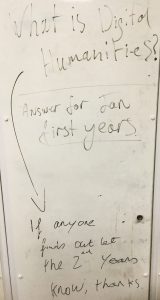
Please, Can we have a definition of what we’re doing in this degree?
Why yes you can, and here’s this years version:
“DH @UCC creates opportunities for students to develop flexible skills in using digital tools and methods to explore and enrich the human experience in the digital age.”
This is a question I looked at previously on this blog, here and later at more length here, and this years is slightly different to previous ones.
So what’s interesting about this version? First, it is strongly linked to what we do in our Digital Humanities at UCC. This matters because uniquely UCC has a large UG DH program. Most DH centres are mainly engaged in advanced research at PhD level, and many of their graduates are aiming for academic research careers. We do that in our PhD program, but the vast majority of our community are undergraduates who will use digital skills and tools in a wide range of projects to ‘enrich the human experience in the digital age’
For the 18 year olds coming into First Year, or the many learners coming to our MA for a digital retrofit, the origin story of Digital Humanities as a marginal struggle against the entrenched Pen and Paper Humanities is utterly irrelevant. This is a generation of learners who grew up with smartphones in hand, for whom digital is life, and definitions and definitional readings based on the old story of how us digital scholars were treated as freaks and geeks doing ‘advanced typing’; well, that so 1968, Grandad.
Deliberately, this definition does not use the word ‘humanities’ because most, if not all, of our students do not explicitly think about what the “humanities” are – the number of universities which actually brand the ‘humanities’ as a field is limited. All Irish universities have Arts degrees, which are in fact Arts & Social Sciences programmes, and the word ‘humanities’ has little resonance for our students.
This definition is somewhat local in both place and time, but I don’t consider that a problem. Definitions of academic fields are, within broad parameters, local. Most historians have a broadly accepted concept of what history is (the actual past, the records left behind, the writing of a narrative which makes sense of the past) but within that differ on their particular emphasis – political, economic, social, cultural, empiricist, marxian, narrative, and so on. Similarly, programmes in English vary from place to place, but all recognizably explore meaning in literary artefacts. There are many definitions of Digital Humanities – witness the @DHDefined twitter feed – and most are recognizably related, but each individual’s working definition has to bridge the field with where they are, and where they are going – which is why, as well as providing our students with a definition of what we do, we should also encourage them to come up with their own definitions, revised from time to time, to map their journey in the digital.
It’s interesting to me that my definition is consistent with my previous versions – back in 2013, I said the humanities were “the quest to understand the human adventure by studying the artefacts we create in all forms – text, image, buildings, design – and the social networks in which they have meaning.” and while the words are different, the emphasis on exploration is still there.
I went on in 2013 to offer an elaboration
The data is transformed in many ways to describe, explore and transform the activities, images and environment observed. It tries to get to the heart of what exactly led to decisions, or choices, that were made, and how these choices came to take the form that they ultimately did, and to empower us to make better choices as we create a new reality for the future”
which is probably a bit too wordy, and draws heavily on my personal academic development as a narrative historian. You can see how I got to it by looking at the 2013 blog post, but for now I’m happy that all of this fits within the big tent of DH while reflecting, more or less, what my students can expect.
Well, mostly… Look out for the next iteration later in the year!
Leave a Reply